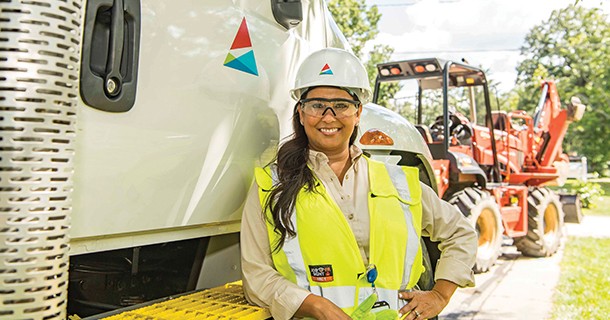Virginia Natural Gas offers tips on how to prepare for hurricane season and keep your family safe before, during and after the storm
VIRGINIA BEACH, Va. – June 1, 2020 – With hurricane season beginning June 1, Virginia Natural Gas recommends customers be prepared in the event of any severe weather. While impacts of the coronavirus (COVID-19) continue to evolve and may continue through hurricane season, Virginia Natural Gas crews are prepared and ready to respond to any storm and remain committed to our No. 1 value – Safety First.
Running through Nov. 30, forecasters are predicting 18 named storms, nine hurricanes and four major hurricanes – one that is Category 3 or higher (115-plus-mph winds) on the Saffir-Simpson Hurricane Wind Scale.
But while forecasting is not an exact science, it’s important to keep in mind that even just one storm could have a significant impact on homes, property and lives. That’s why Virginia Natural Gas is providing customers with the following recommended natural gas safety guidelines for use during a weather emergency:
Meter Safety
- DO NOT turn off your gas supply at the main meter. Only Virginia Natural Gas or emergency personnel should turn the valve on or off.
- Leaving natural gas meters on helps to maintain proper pressure in the gas piping within homes or businesses and can prevent water from entering the fuel lines should flooding occur.
- Customers are encouraged to know the location of their natural gas meter.
- Following a weather emergency, customers should ensure the natural gas meter is visible, and the area surrounding the meter is free of trash and debris. Mechanical equipment used after the storm to clean up a location may damage the meter if it is hidden.
- If a natural gas meter is damaged or an underground gas line is exposed, customers should immediately leave the area, and call the Virginia Natural Gas 24-hour emergency response line at 1-877-572-3342 or 911 from a safe location.
Appliance Safety Before and After the Storm
- Customers are advised to leave their natural gas service operational during a hurricane or severe storm. Most modern gas appliances have safety valves that shut off the flow of natural gas automatically with a loss of gas pressure or flooding of the appliances.
- Leaving natural gas meters on helps to maintain proper pressure in the gas piping within homes or businesses and can prevent water from entering the fuel lines or appliance control valves should flooding occur.
- Electronic ignition appliances will not come on when the power source has been impacted.
- If you are uncomfortable leaving your appliances operational, contact a trained professional (certified plumber or HVAC rep) to shut off your appliances at the cutoff valves. When it is safe to do so, have them return to turn the valves back on, leak test the line and turn on and test the appliance for safe operation.
- If flooding occurs at a residence or business and the gas appliances are underwater, customers are advised not to operate their appliances until a safety inspection is conducted by a certified plumber or HVAC representative.
Damage Prevention
- Strong winds and saturated ground could cause trees to become uprooted. Before removing downed trees, customers should contact VA811 by calling 811 to have the location of underground utility lines marked since downed trees could become tangled with natural gas lines.
- If a natural gas meter is damaged or a natural gas line is exposed, customers should immediately leave the area and call the Virginia Natural Gas 24-hour emergency response line at 1-877-572-3342 or 911 from a safe location.
Detecting Gas Leaks
- ·If customers smell the distinctive “rotten-egg” odor associated with natural gas, they should leave the area immediately and move a safe distance away from the potential leak, while avoiding any action that may cause sparks.
- Look for blowing dirt, discolored vegetation or continued bubbling in standing water.
- Customers should never try to identify the source of a leak or stop the leak themselves.
- Avoid using any sources of ignition, such as cell phones, cigarettes, matches, flashlights, electronic devices, motorized vehicles, light switches or landlines, as natural gas can ignite from a spark, possibly causing a fire or explosion.
- Customers should call the Virginia Natural Gas 24-hour emergency response line at 1-877-572-3342 or 911 once they are in a safe place out of the area of the suspected leak. They should also stay away until Virginia Natural Gas or emergency personnel indicates it is safe to return.
Natural Gas Generators
- During a power outage, natural gas generators provide continuous fuel supply from an existing natural gas line. While these units are available in a range of sizes to meet various energy needs, customers are encouraged to contact Virginia Natural Gas before purchase and installation to determine whether their service line and meter meet load requirements for the generator’s safe and efficient operation.
Carbon Monoxide Safety
- To ensure the safe, proper operation of natural gas appliances, such as a furnace and water heater, and to prevent the potentially hazardous buildup of carbon monoxide within your home or business, ensure that outdoor vent openings and air intakes are not obstructed.
- If customers smell natural gas or suspect carbon monoxide is present in their home or business, they should immediately leave the area and call the Virginia Natural Gas 24-hour emergency response line at 1-877-572-3342 or 911 from a safe location.
- Residents are encouraged to seek medical attention immediately if anyone in their home or business experiences possible symptoms of carbon monoxide poisoning, which include headache, dizziness, fatigue, nausea and vomiting.
Personal Safety
- Your personal safety is the most important thing before, during and after a storm. The Red Cross urges everyone to be prepared before the storm hits. This means having an emergency preparedness kit that includes among other things, a seven-day supply of medications, copies of important documents such as insurance policies, non-perishable food items and water for two weeks, extra cash, batteries for flashlights and radios, and personal hygiene products.
- If you must travel after a storm, stay away from where crews are working. Make sure to follow road signs, drive cautiously and follow directions in the areas of a work crew.
- Know your flood zone and potential risk hazards in your area. Visit the FEMA flood map service and simply enter your address.
- For more information on personal hurricane preparedness, visit the Red Cross.
How to connect with us
During a storm, customers can get the latest updates by following us on Facebook, Twitter and Instagram.
For more information about natural gas safety, visit virginianaturalgas.com/safety.
###
About Virginia Natural Gas
Virginia Natural Gas is one of four natural gas distribution companies of Southern Company Gas, a wholly owned subsidiary of Southern Company (NYSE: SO). Virginia Natural Gas provides natural gas service to nearly 300,000 customers in southeast Virginia and has been recognized as one of the safest, most reliable and customer-focused natural gas service providers. Consistently ranked in the top quartile for customer satisfaction by J.D. Power and Associates, the company has also been recognized by the Virginia Department of Mines, Minerals and Energy and the Virginia Oil and Gas Association for its safety, community outreach and educational programs, and was named Local Distribution Company for three consecutive years. Virginia Natural Gas has been ranked by its business customers as being one of the most Trusted Business Partners in the utility industry according to Cogent Reports, and as one of the Top Workplaces in Hampton Roads by Inside Business. For more information, visit virginianaturalgas.com and connect with the company on Facebook, Twitter and Instagram.
About Southern Company Gas
Southern Company Gas is a wholly owned subsidiary of Atlanta-based Southern Company (NYSE:SO), America’s premier energy company. Southern Company Gas serves approximately 4.2 million natural gas utility customers through its regulated distribution companies in four states and approximately 700,000 retail customers through its companies that market natural gas. Other nonutility businesses include investments in interstate pipelines, asset management for natural gas wholesale customers and ownership and operation of natural gas storage facilities. For more information, visit southerncompanygas.com.
Media Contact:
Rick DelaHaya
o: 757.616.7510 | c: 757.323.7366 | rdelahay@southernco.com


